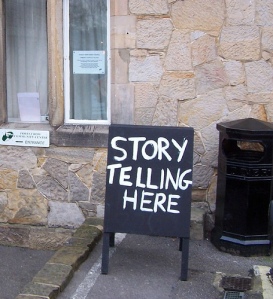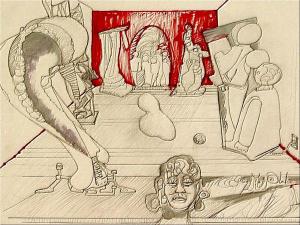Only in reviewing my virtual book shelf for the week did I realize the connections among the reading I’ve done. Concepts such as subjectivity in the archives, archivists as multi-dimensional professionals whose work can be considered mediation or story-telling, or even the character of an archive itself are ones that I ponder and that linked my reading. There is no lack of literature on this topic–check the footnotes of these materials for resources.
Article I am read this week
Terry Cook is one of those thinkers who continually shapes my perspective on the archival profession. When I read his articles, I drain highlighters to mark my favorite passage, give myself hand cramps from scrawling notes in the margins, and as a graduate student, incorporated at least one piece of his writing into nearly all of my papers. Recently, I read “The Archive (s) is a Foreign Country: Historians, Archivists, and the Changing Archival Landscape” found here.
This relatively recent article (published in 2011) attempts to understand the roles of historians and archivists in the archive: are these divergent professions? What about the way they view archival materials? Can this division ever been reconciled? He writes,
(Emphasis in all quotes my own)
Archives are not unproblematic storehouses of records awaiting the historian, but active sites of agency and power. Until recently, it has been in the interests of both professions to deny…the subjectivity of archives. Both professions could benefit significantly…from a renewed partnership centered upon the history of the record to produce better history.
In the end, that partnership is still being forged in several ways. What I found so helpful about this article is that Cook stepped back for a moment to eloquently capture the craft or act of archiving.
The very act of archiving…ensured that the past was perceived as different from the present, more foreign than familiar, and, equally, that the archiving act itself imbued the newly collected and accessible documents with different meanings and, accordingly, different uses.
More specifically, he takes a moment to consider appraisal, the process of identifying materials with enduring value. For those of you unfamiliar with the world of archival appraisal, let me say that it’s a political (lower case ‘p’) endeavor that changes with each type of material or collection and can be characterized as any of the above:
convoluted
idiosyncratic
tedious
subjective
systematic
unsystematic
fulfilling
draining
policy-driven
intuitive
and so much more…you get the idea. In graduate school, I took an entire class focused on this step of the archival process. And, I must say, it was theoretical and difficult. But, I enjoyed every moment! You can find a good definition of appraisal here. Cook says this about appraisal,
As archivists appraise records, they are doing nothing less than determining what the future will know about its past: who will have continuing voice and who will be silenced.
Finally, Cook remarks
The archivist is viewed by historians as a kind of honest broker, or informed tour guide, between the original creators of the record and its later use by researchers.
And…
If archivists so embrace their roles in more self-conscious archives as historians of the record…historians will be afforded richer possibilities for exploring the past through more deeply contextualized archives.
Indeed, playing a role in cultivating a “self-conscious” archive is difficult especially when we must consider influences such as access, time constraints and budget. But, as an ideal, I am completely on board!
Thesis I read this week
I had the opportunity to read the 2009 work of a Library colleague found here. And I must say, it’s one of the best pieces I’ve read in a while. Like Cook, Bert Lyons gets it right. His work draws out an aspect of Cook’s argument of subjectivity in the archive. Lyons explores this concept more fully and remarks,
The scope of this paper is to illuminate the ambiguities, the complexities, the practices, the standards and the layers of interpretation related to processing archival collections—writing archives and creating order.
Right off the bat, he refers to “layers of interpretation,” which sets the stage his position that, in fact, archives are interpretative. In fact, he goes so far to say, and here I’m paraphrasing with my own pithy question—why would we consider them objective?
And, excuse the length of this final quote, but it’s a great one!
We as archivists are in contact with the past at these moments. We are mediators slowing time to a halt, shuffling it, dusting it off, and sending it back into motion. How can it be said that the archivist is neutral, objective, a pawn? Archivists are agents of history, agents of the past, and agents in the present—at the intersection of the past, the present, the future. Archivists patrol borderlands. We roam boundaries spatial and temporal—our invisible, yet very visible marks and fingerprints add, subtract, soften, harden, and accidentally or intentionally mold the past—just barely sometimes, and other times unavoidably.
When I finished his thesis, I came away with two deceptively simple, spot on and challenging notes taken directly from his work:
The archive is the story of the archivist.
Nothing in an archive is unmediated.
Lyons questions archival principles that guide our work, our perceived role as record-keepers who don’t influence collections (he calls it ‘privileging’), and, of course, the multiple points at which archivists become story-tellers.
Digital content I read this week
The Signal: Digital Humanities and Digital Preservation, to recognize “Day of Digital Humanities.”
HASTAC: Wikipedia is Pushing the Boundaries of Scholarly Practice but the Gender Gap must be Addressed. About 90% of Wikipedia editors are male. This poses a problem. Here again we have questions of subjectivity!

